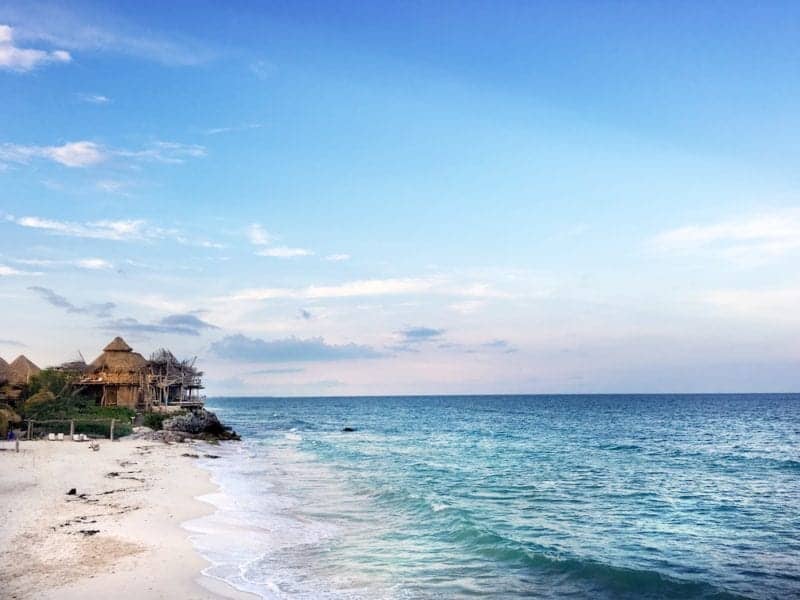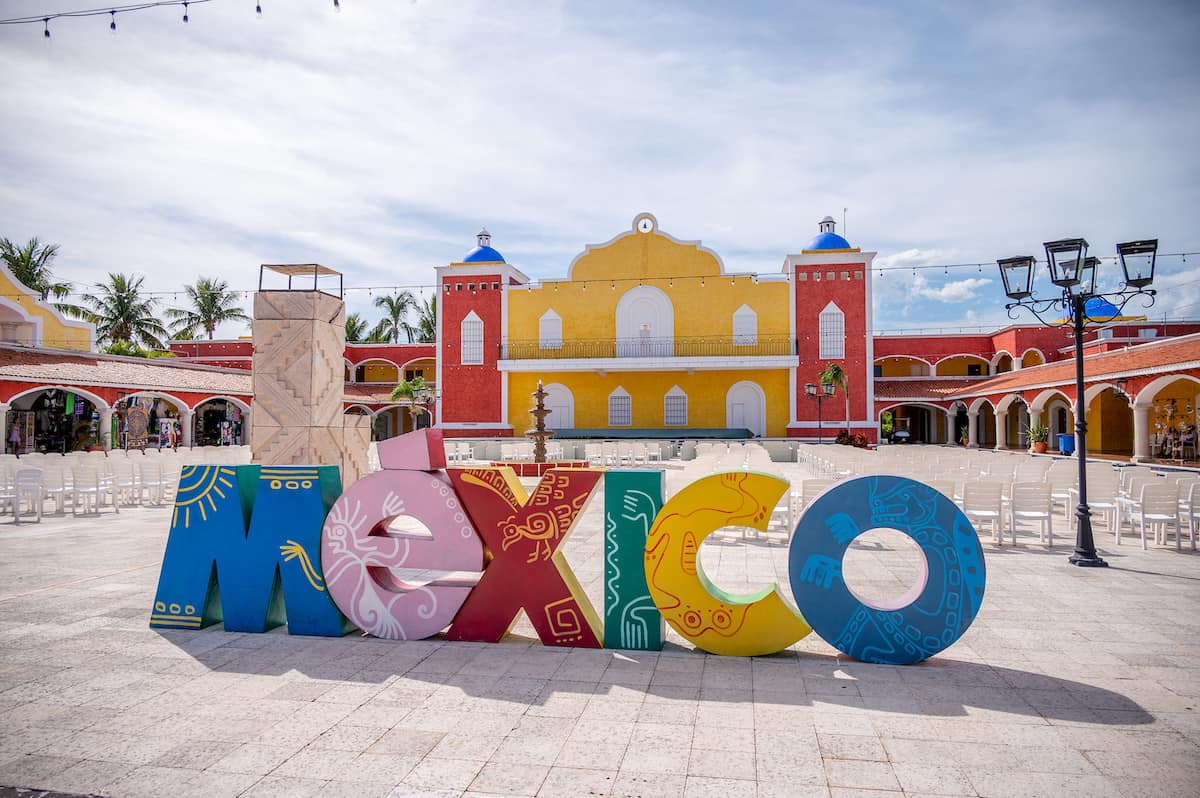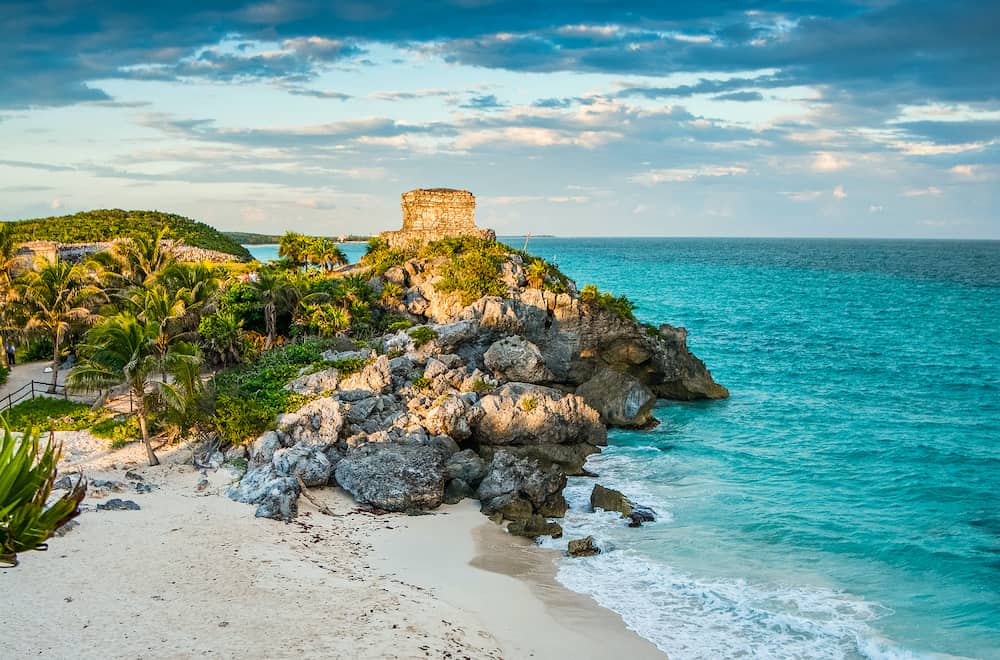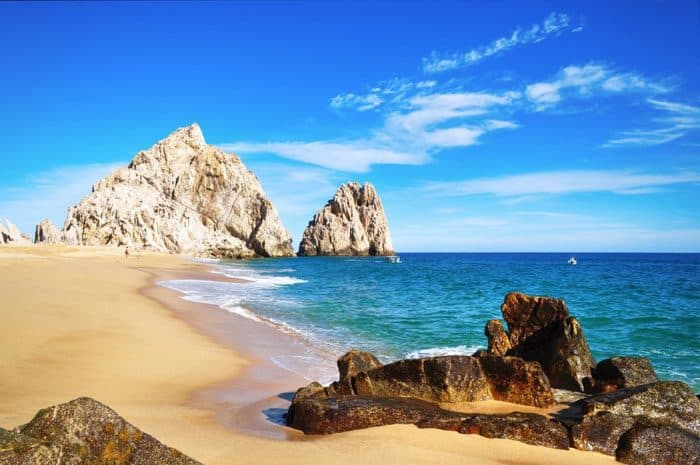is Tulum a good place to live?
You’ve been vacationing in Tulum, Mexico, and have grown to love its culture, history, and people. Now, you’re thinking about moving there but are unsure if it’s the right decision.
Moving to a new place, like Tulum, is a big and exciting step. It requires careful consideration of many factors, including family, work, and lifestyle needs.
Tulum, a beautiful coastal town in the Riviera Maya, is known for its stunning beaches, clear waters, and historic Mayan ruins. It’s become a favorite spot for expats and digital nomads, thanks to its laid-back vibe and cultural richness.
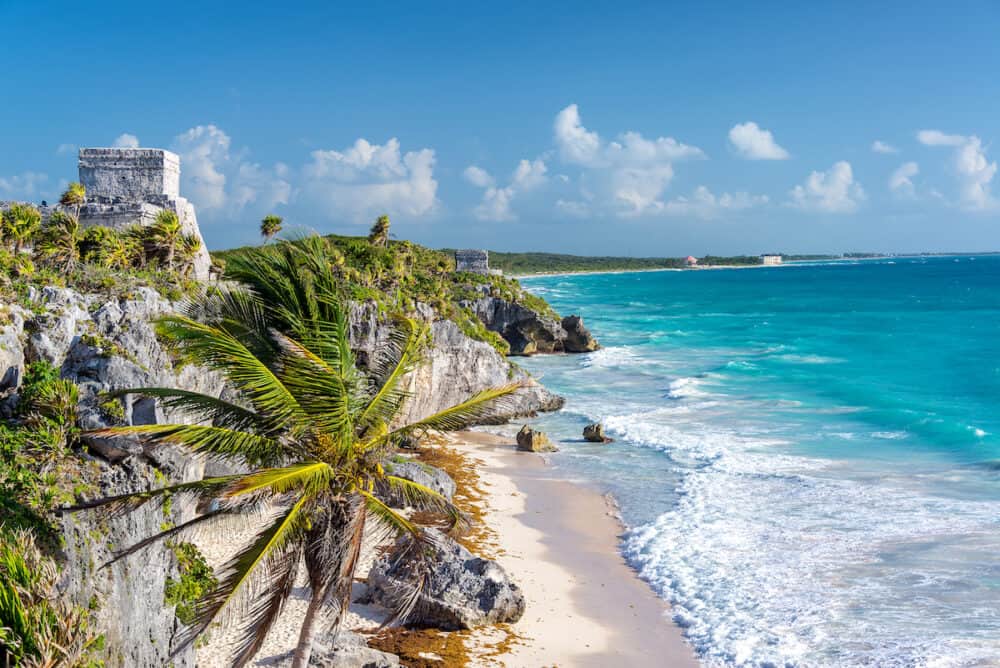
The town offers modern amenities, like trendy cafes and coworking spaces. However, its popularity also brings challenges like higher living costs and environmental issues due to over-tourism.
It’s crucial to do thorough research and maybe even get advice from expats or professionals like immigration consultants. To help you decide, we’ve put together a list of pros and cons to consider when thinking about living in Tulum, to make your decision easier.
Plan your trip
Save on fees abroad with the Wise Card—use it at ATMs, restaurants, and for flights or hotels in over 150 countries. Manage 40+ currencies in real-time with the Wise app.
Need Help Planning?
- Cheap Flights: Find the best deals.
- Accommodation: From hostels to luxury stays.
- Car Rental: Affordable options worldwide.
- Sightseeing Tours: Explore without breaking the bank.
- Travel Adapter: One adapter for all your needs.
- Travel Insurance: Don’t risk it—stay covered.
This post includes affiliate links. Read my full disclosure and content policy.
Cost of Living
Living in Tulum, Mexico, can cost about $1,500 monthly per person, but this varies with your lifestyle and housing.
Although cheaper than many major cities in Canada and the US, some may find it costly for the quality of life offered. Budgeting for rent, food, transportation, utilities, and healthcare is essential, especially as healthcare rules differ in a new country.
Pros of Living in Tulum:
- Affordable Housing: Tulum has various housing options, from budget apartments to luxury beachfront homes, often more affordable than in Western countries.
- Cost-Effective Dining: Eating at local places and buying groceries at markets is usually cheap, allowing you to enjoy Mexican cuisine on a budget.
- Low Utility Costs: Basic utilities like electricity, water, and internet are generally inexpensive.
- Natural Beauty: Tulum’s beaches, cenotes, and jungles are mostly free or have low entry fees.
- Affordable Transportation: Buses and taxis are budget-friendly for getting around and exploring.
Cons of Living in Tulum:
- Rising Prices: Tulum’s popularity has led to increased prices, especially in the beach zone, making some areas less affordable.
- Variable Quality: While there are budget options, the quality of cheaper goods and services may be lower.
- Tourist Season Inflation: Prices for lodging, dining, and activities can spike during peak tourist times.
- Currency Exchange Risk: Those relying on foreign currency incomes face risks due to exchange rate fluctuations.
- Limited Jobs: Job opportunities, particularly for expats, are scarce. Many in Tulum work remotely, are self-employed, or are retirees.
- Healthcare Access: Healthcare is more affordable but specialized services might require travel to larger cities like Playa del Carmen or Cancun.
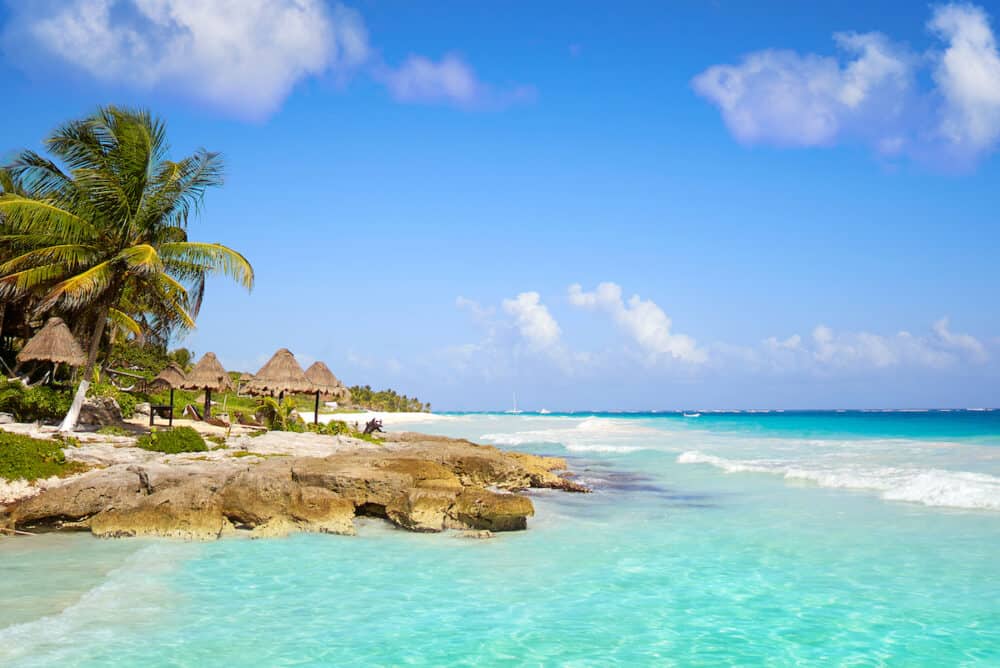
Infrastructure
Tulum’s infrastructure has developed significantly due to its rising popularity as a tourist spot and a residential area. It boasts improvements but also faces challenges, especially in high-traffic tourist areas.
While Tulum’s commitment to preserving natural beauty and sustainability is admirable, issues like overcrowding and waste management are notable.
When thinking of moving to Tulum, it’s important to check the infrastructure of different neighborhoods to see if they match your needs.
Pros:
- Natural Beauty: Tulum is famous for its beautiful beaches, jungles, and cenotes, with efforts to preserve its environment.
- Eco-Friendly Initiatives: The town promotes sustainable practices in businesses and accommodations.
- Cultural Sites: Home to important Mayan ruins like the Tulum Ruins, offering cultural richness and exploration opportunities.
- Tourist Amenities: There’s a variety of restaurants, bars, shops, and entertainment due to tourism growth.
- Transportation: Improved roads, bike lanes, and public transportation options.
- Internet Connectivity: Reliable internet service in many areas, crucial for remote workers and online businesses.
Cons:
- Overcrowding: Tulum can get extremely crowded, especially in peak tourist seasons, leading to traffic jams and crowded spots.
- Waste Management Issues: The rapid growth and tourism strain the town’s waste systems, causing litter and pollution problems.
- Water and Power Outages: Some areas face occasional disruptions, especially during heavy rains.
- Limited Medical Facilities: For specialized healthcare, travel to larger cities like Playa del Carmen or Cancun may be necessary.
- Road Conditions: Despite improvements, some areas still have poor roads with potholes and unpaved sections.
- Limited Public Services: Access to services like schools and healthcare can be limited, particularly in less developed parts of Tulum.
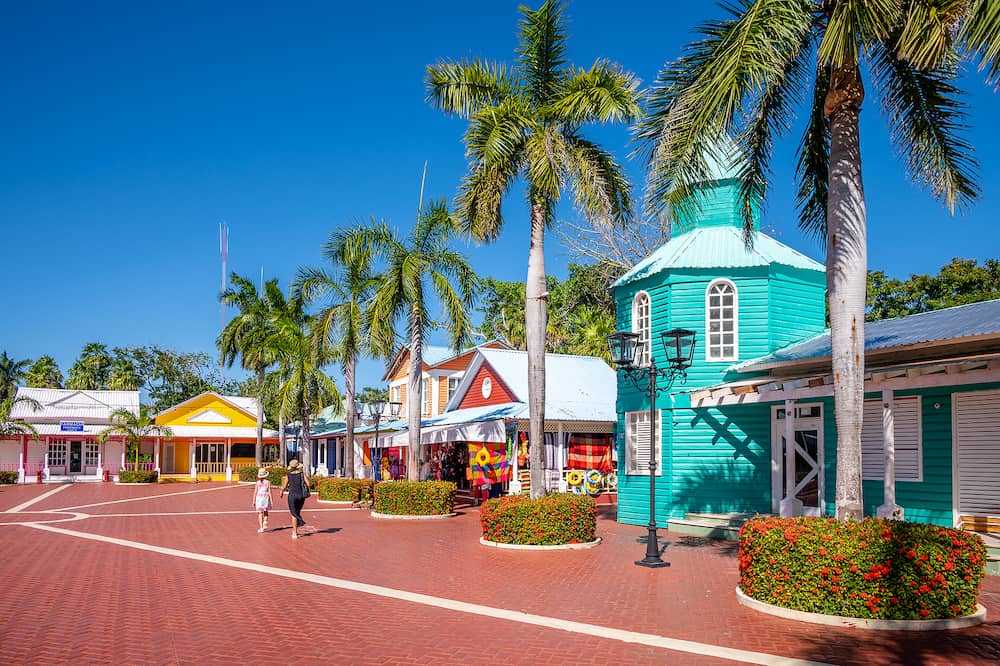
Security & Safety
Tulum is generally a safe beach town, but like any popular destination, it has its share of issues, including a party culture that can attract drugs and crime.
However, it’s considered safe for tourists and residents, with a lower crime rate than many places in Mexico. Still, it’s important to stay alert to petty crimes and take common precautions.
Pros:
- Low Crime Rate: Tulum’s crime rate is lower compared to other Mexican tourist spots, with rare violent crimes against tourists.
- Tourist Police: A dedicated police force ensures visitor safety.
- Community Watch: Some neighborhoods have community watch programs to improve security and prevent crime.
- Natural Beauty: The town’s beaches and cenotes are generally safe for visitors.
- Well-Traveled Destination: High tourism can contribute to safety, as more people on the streets can deter crime.
Cons:
- Petty Crime: Theft and pickpocketing can occur, especially in crowded areas and during tourist season.
- Limited Police Presence: Police resources can be stretched thin, potentially leading to slower responses in non-emergencies.
- Traffic Safety: Traffic safety is a concern, especially in the busy Tulum Beach Zone.
- Environmental Hazards: There are risks associated with natural attractions, like strong currents and wildlife.
- Healthcare Limitations: Specialized medical care might require travel to larger cities.
- Alcohol-Related Issues: The party scene can lead to alcohol-related accidents and incidents.
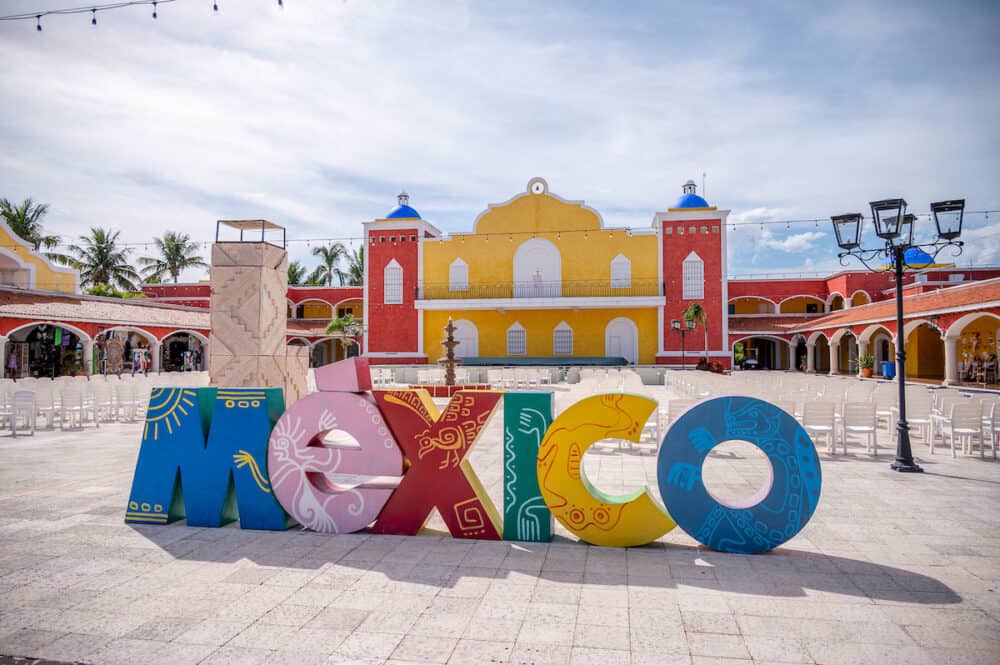
Accommodation
Tulum offers a variety of accommodation options, from luxury beachfront resorts to budget-friendly hostels, appealing to different budgets and preferences.
Dreaming of a bohemian villa in the jungle or a relaxing beachfront spot is achievable here. However, one must consider factors like rising prices, high demand during peak seasons, and potential infrastructure issues in some areas.
Read more: 3 Days in Tulum
Pros:
- Diverse Options: Tulum’s accommodations range from hostels and boutique hotels to luxury resorts and vacation rentals, catering to various preferences.
- Natural Beauty: Many lodgings are designed to blend with the town’s natural beauty, offering beachfront views and jungle settings.
- Wellness Focus: Known for wellness, Tulum has accommodations like yoga retreats and eco-resorts.
- Beach Access: Many places in the Tulum Beach Zone offer direct beach access.
- Bohemian-Chic Atmosphere: The town is famous for its bohemian-chic style, evident in many boutique hotels and lodges.
- Privacy: Secluded jungle and beachfront accommodations provide a private and serene experience.
Cons:
- High Demand and Prices: Tulum’s popularity has led to increased accommodation prices, especially in the Beach Zone, with affordability challenges during peak seasons.
- Limited Infrastructure: Some areas, particularly remote from the town center, might lack reliable utilities and services.
- Booking Challenges: Peak seasons require early booking due to high demand.
- Noise and Crowds: Places near popular beach clubs and nightlife can be noisy and crowded.
- Environmental Limits: Eco-friendly accommodations might have restricted amenities like air conditioning to reduce environmental impact.
- Accessibility Issues: Some locations are harder to access due to unpaved roads and limited signage.
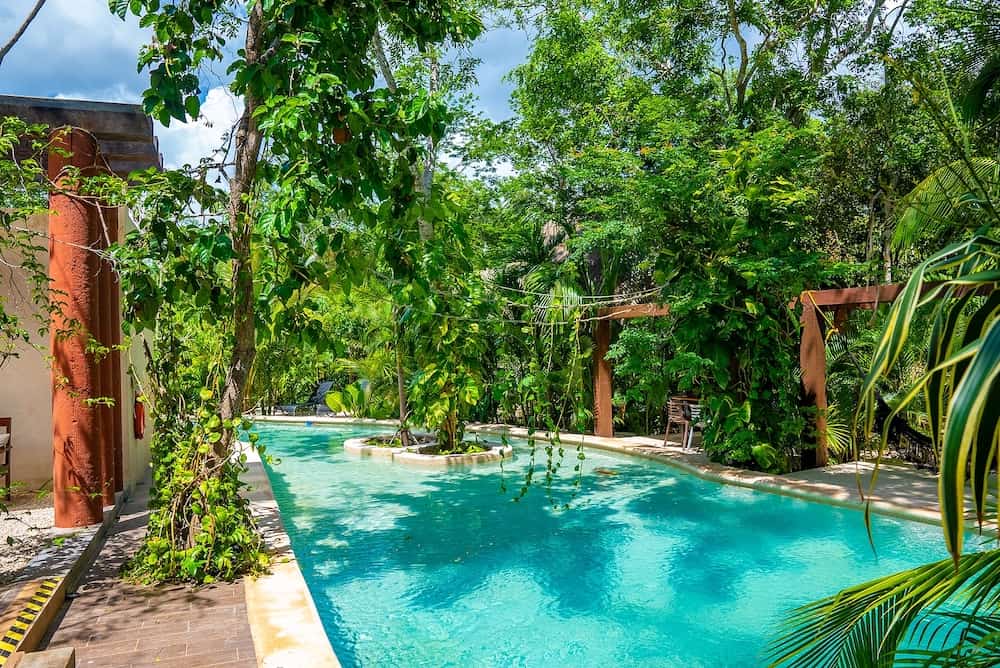
Transport
Tulum’s transportation scene is unique, with options like bicycles being popular among expats and digital nomads. While taxis and public buses are available, many prefer biking, especially for exploring the town center.
Renting a car offers flexibility but can be costly and challenging due to parking or language issues. It’s important to consider the environmental impact and potential weather disruptions, especially during the wet season.
Pros:
- Affordable Public Transport: Buses and taxis in Tulum are cost-effective for getting around and exploring nearby areas.
- Biking Friendly: The town is great for biking, with lanes and rental services, offering an eco-friendly way to see the area.
- Car Rentals: Renting a car provides flexibility for visiting regional attractions and cenotes.
- Accessible Taxis: Taxis are readily available, offering reliable transport within and around Tulum, affordable by Western standards.
- Close Attractions: Many attractions, like beaches and ruins, are near the town center, easily reachable by various transport modes.
Cons:
- Traffic Congestion: Peak tourist seasons can lead to traffic jams, particularly in the Tulum Beach Zone.
- Limited Parking: Finding parking can be difficult in crowded areas, and some places charge extra for it.
- Road Conditions: Some roads, especially in less developed neighborhoods, may be in poor condition with potholes and unpaved sections.
- Language Barrier: Not all transportation providers speak English, which can lead to communication issues.
- Environmental Impact: Cars and taxis contribute to pollution and traffic. Tulum promotes eco-friendly transport, but challenges persist.
- Hurricane Risk: Tulum is prone to hurricanes and tropical storms from June to November, which can disrupt travel plans.
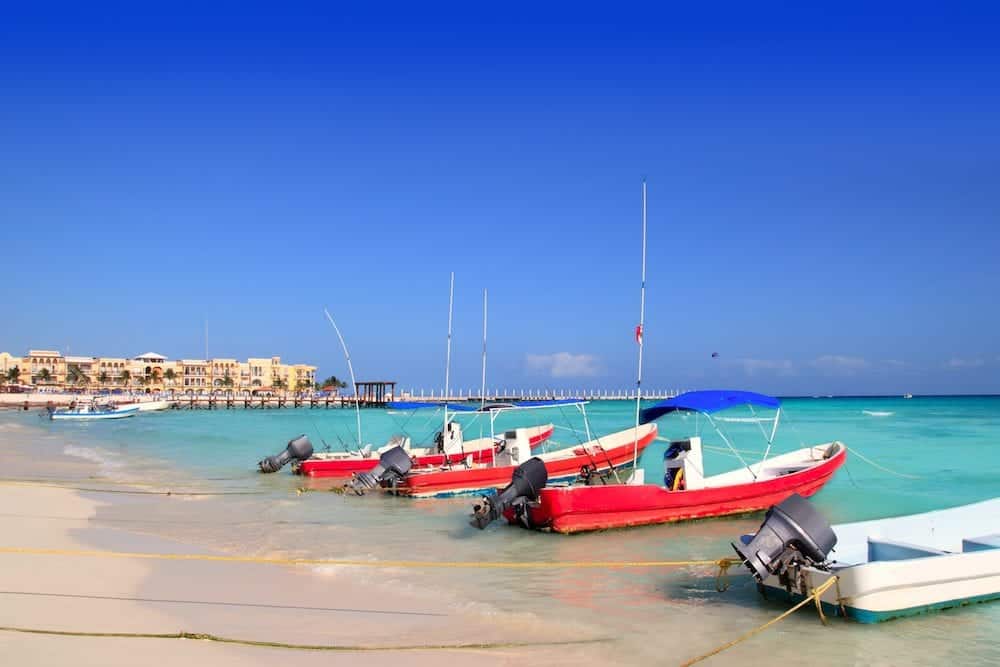
Activities
Tulum attracts countless visitors yearly with its stunning cenotes, rich history, and laid-back vibe. The town offers a range of activities from historical exploration to nature adventures and relaxation.
While Tulum’s beauty and cultural offerings are appealing, challenges like managing crowds and environmental impact are important considerations.
Pros:
- Natural Beauty: Tulum boasts beautiful beaches, cenotes, jungles, and the Tulum Ruins.
- Water Activities: Ideal for water sports enthusiasts, offering swimming, snorkeling, diving, paddleboarding, and kiteboarding.
- Mayan Culture: The Tulum Ruins provide a glimpse into Mayan history and culture.
- Eco-Tourism: Known for eco-friendly tourism, with opportunities to visit eco-parks and participate in wildlife conservation.
- Wellness and Yoga: A hub for wellness, offering yoga retreats, wellness centers, and spas.
- Cultural Events: Hosts various cultural events and festivals celebrating Mexican traditions, music, art, and cuisine.
Cons:
- Crowds in Peak Seasons: Popular spots can get overcrowded, especially during tourist seasons, necessitating advance planning.
- Weather Disruptions: The wet season (June to November) poses a risk of hurricanes and storms, potentially affecting activities and travel.
- Tourist Pricing: Activities and tours may be more expensive than in less tourist-centric areas of Mexico.
- Environmental Impact: The influx of tourists can strain ecosystems, leading to pollution and litter.
- Language Barriers: Not all guides and operators speak English, which might affect the experience.
- Accessibility: Some activities require good physical fitness and mobility, like exploring cenotes or jungle trails.
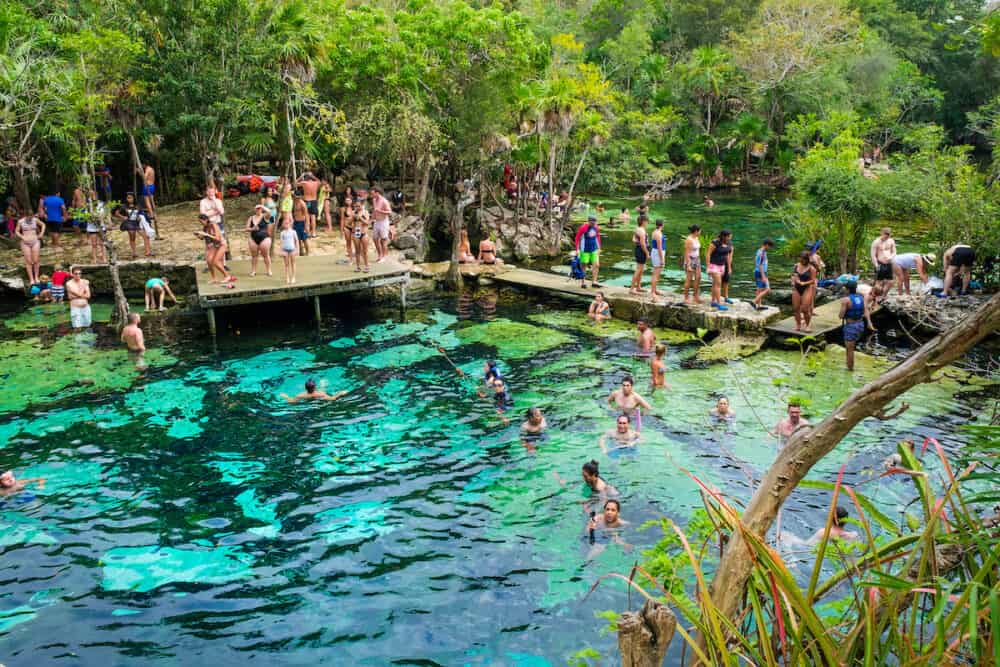
The Weather
Tulum’s appeal includes its sunny beaches and warm climate, perfect for those seeking a tropical lifestyle. The weather features a tropical climate with distinct wet and dry seasons, offering year-round warmth but with varying conditions.
Pros:
- Warm Tropical Climate: Tulum enjoys a warm climate throughout the year, with average temperatures between 77-95°F (25-35°C).
- Abundant Sunshine: The town gets plenty of sunshine, ideal for beach days and outdoor activities.
- Escape from Cold Winters: Popular among snowbirds and retirees escaping colder climates, especially during winter in the Northern Hemisphere.
- Year-Round Water Activities: The warm weather allows for activities like swimming, snorkeling, diving, and paddleboarding in the sea and cenotes.
- Lush Tropical Landscape: The climate contributes to Tulum’s beautiful green scenery.
Cons:
- High Humidity: Especially during the wet season, humidity can be high, necessitating precautions against heat-related issues.
- Rainy Wet Season: The wet season (June to November) brings heavy rains, storms, and hurricane risks.
- Insects: Warm and humid conditions are conducive to mosquitoes and other insects, requiring preventive measures.
- Hurricane Risk: Tulum is prone to hurricanes during the wet season, impacting travel plans.
- Seasonal Crowds: The dry season attracts many tourists, leading to crowded conditions and higher prices.
- Variable Weather: Although generally pleasant, weather conditions can vary, with some years experiencing more rain or storms.
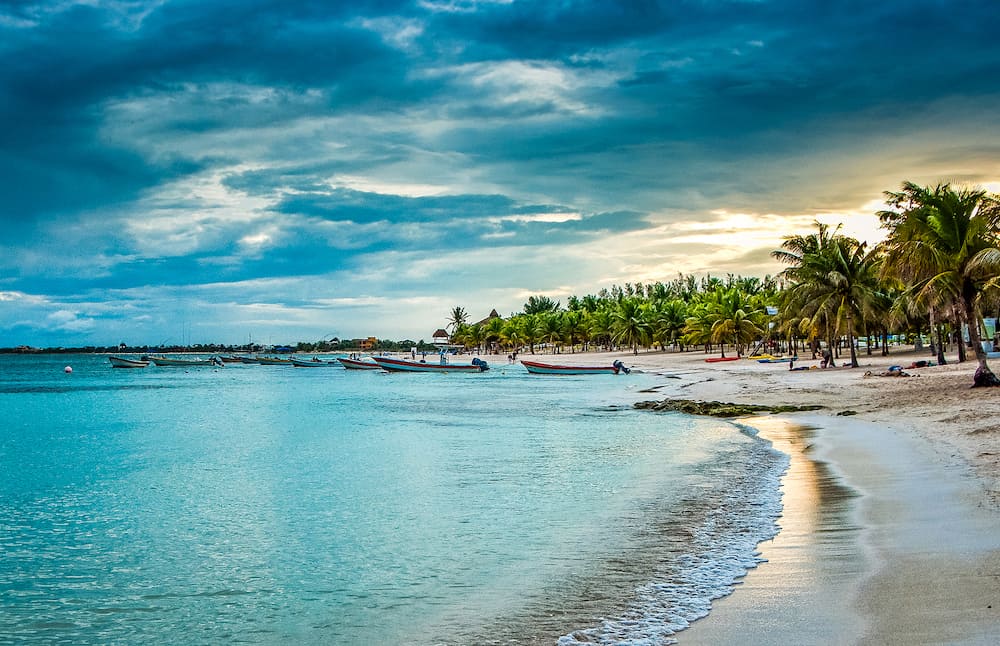
Shopping
Tulum’s shopping scene is vibrant, with a mix of local and expat stores. You’ll find a variety of gift shops, tattoo parlors, clothing stores, and arts and crafts shops, adding color and excitement to the streets.
While catering mainly to tourists, there are also malls on the outskirts for expats and residents. Be prepared for higher prices, especially during peak seasons, and potential language barriers.
Pros:
- Artisan Crafts: Famous for handcrafted jewelry, textiles, pottery, and artwork.
- Bohemian Boutiques: Stylish clothing, swimwear, and accessories are available in various bohemian shops.
- Local Markets: Hosts markets with fresh produce, handmade goods, and street food.
- Sustainable Products: Many stores focus on eco-friendly items like organic clothing and natural cosmetics.
- Mexican Souvenirs: Offers a variety of souvenirs, including textiles, folk art, and ceramics.
- Haggling: Common in local markets and some shops, allowing for price negotiation.
Cons:
- Higher Prices: As a tourist destination, Tulum often has higher prices compared to other Mexican areas.
- Limited Bargaining: Haggling might be less effective in high-end boutiques and tourist shops.
- Varied Selection: The selection might differ from larger cities or more established shopping areas.
- Crowded Shops: Shops can be particularly busy during tourist seasons.
- Counterfeit Goods: Like many tourist spots, some stores might sell counterfeit or low-quality products.
- Language Barrier: Communication can be challenging for non-Spanish speakers in some shops.
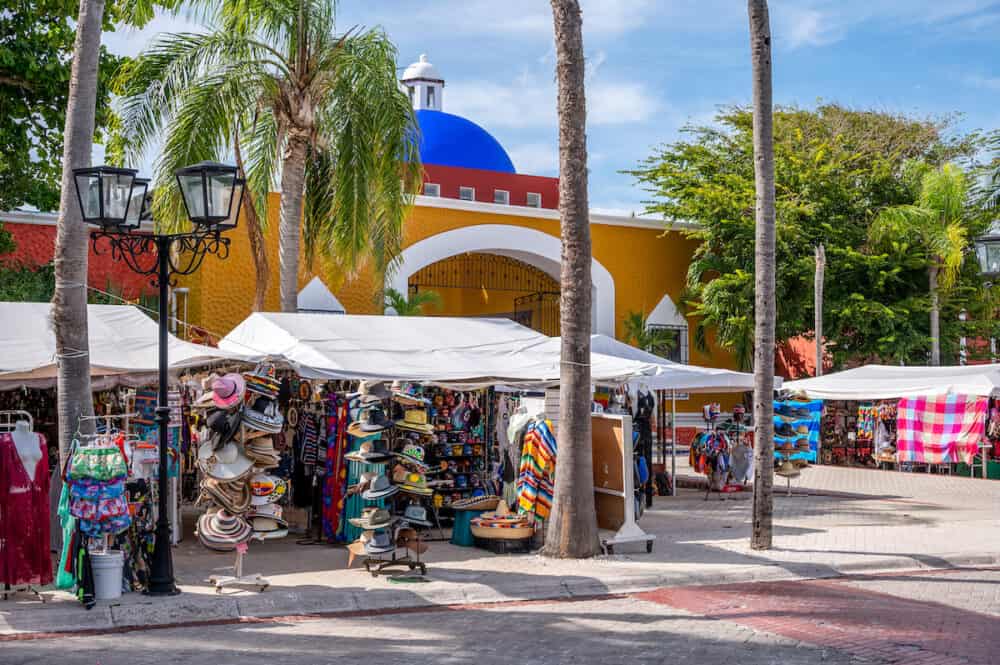
The Community
So how many expats live in Tulum?
Tulum’s community is a dynamic blend of locals, expatriates, and tourists, creating a culturally diverse and vibrant atmosphere.
This diversity brings different cultural expereinces and networking opportunities but also poses challenges like language barriers and development concerns.
Pros:
- Diversity and Inclusion: Tulum’s community is a mix of different backgrounds, enhancing cultural diversity.
- Cultural Vibrancy: The town’s cultural scene includes art, music, and local traditions, with events celebrating Mexican culture.
- Strong Expat Community: A thriving expat population offers support, camaraderie, and networking for retirees, digital nomads, and those seeking a relaxed lifestyle.
- Wellness and Eco-Focus: Known for its emphasis on wellness and sustainability, many residents and businesses prioritize healthy living and environmental conservation.
- Local Markets: Markets and artisan fairs allow interaction with local artisans and support for local businesses.
- Access to Nature: Proximity to beaches, cenotes, and jungles encourages an active and nature-focused lifestyle.
Cons:
- Tourist Crowds: Peak tourist seasons can overcrowd Tulum, affecting the local quality of life and causing congestion.
- Transient Population: The town’s tourist and expat popularity leads to a somewhat impermanent community feel.
- Language Barriers: While English is common, not everyone is fluent, potentially complicating communication for non-Spanish speakers.
- Infrastructure Challenges: Some areas may lack reliable utilities and services like electricity and water.
- Rising Costs: The influx of tourists and expats has driven up costs, making it harder for some to afford living in Tulum.
- Environmental Concerns: Rapid growth and development pose challenges to waste management, water quality, and the preservation of ecosystems.
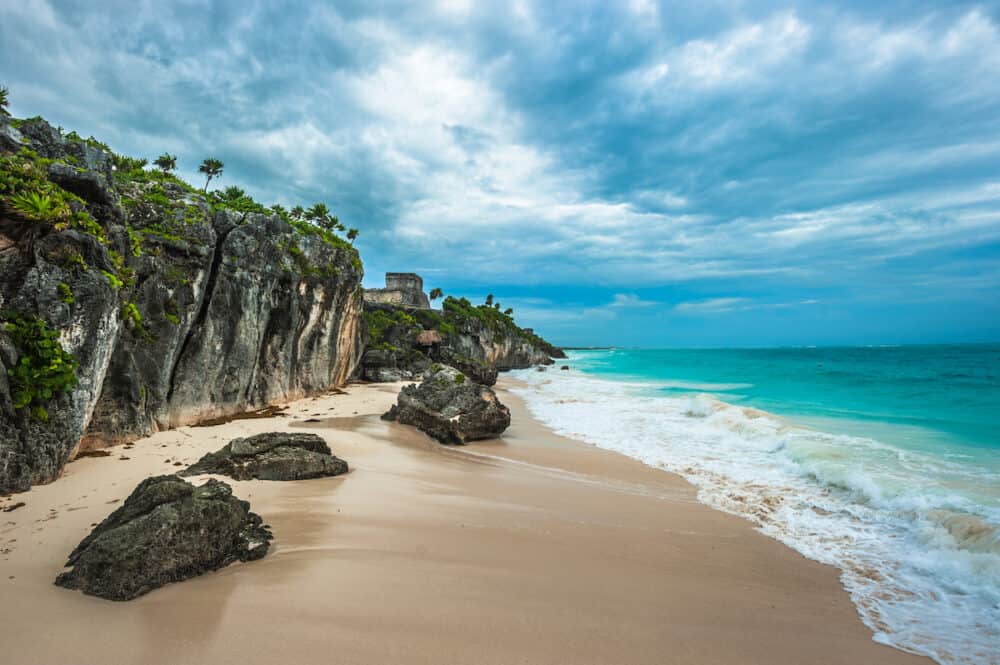
Retirement
Retiring in Tulum offers a relaxed lifestyle amidst natural beauty and cultural richness. However, retirees should consider challenges like language barriers, infrastructure limitations, and healthcare access. Weighing these factors is crucial for those planning to retire in this coastal paradise.
Pros:
- Warm Climate: Tulum’s year-round warm temperatures attract retirees escaping cold winters.
- Natural Beauty: Offers stunning landscapes, including beaches, cenotes, and jungles for recreation and exploration.
- Affordable Cost of Living: Compared to many Western countries, Tulum is relatively budget-friendly for retirees.
- Cultural Experiences: Rich in Mexican culture, history, and traditions, with opportunities to visit ruins, enjoy local cuisine, and engage in cultural events.
- Community: The Tulum community provides a chance for retirees to make new friends and connect with like-minded people.
- Wellness and Relaxation: With yoga retreats and eco-friendly resorts, Tulum is conducive to relaxation and wellness.
Cons:
- Language Barrier: Not everyone in Tulum is fluent in English, which can be challenging.
- Healthcare Limitations: Specialized medical services may require travel to larger cities.
- Infrastructure Shortcomings: Some areas lack reliable utilities like electricity and water supply.
- Tourist Crowds: The tranquility sought by retirees can be disrupted by tourist crowds during peak seasons.
- Increasing Costs: The influx of tourists and expatriates has driven up the cost of living, particularly housing and dining.
- Distance from Family: For retirees with family abroad, the distance from Tulum to their home countries can be a significant consideration.

Final Thoughts:
Moving to Mexico is an exciting and adventurous choice; moving to Tulum is an even more exhilarating choice since it is literally the destination of dreams.
Everyone would love to live in a tropical destination like the lifestyle Tulum or even Playa Del Carmen can offer. Still, there are many factors to consider before making any formal step.
Tulum real estate and other accommodations are a significant priority to think about since prices have risen exponentially over the past few years.
You will also have to embrace the party life and the people it attracts since Tulum has a heavy reputation for it, so prepare for loud music and raucous street people.
The infrastructure is different from its Western counterparts. Still, it is steadily growing, and many great things are currently taking place and in the process of improving this town.
At the end of the day, Tulum makes a great choice if you need to move to a Mexican Caribbean destination that falls under your personal preferences and check at least most of the boxes.
Read more:



